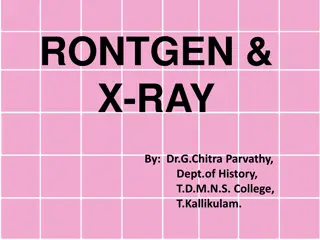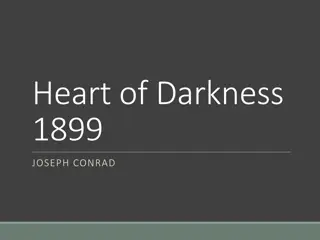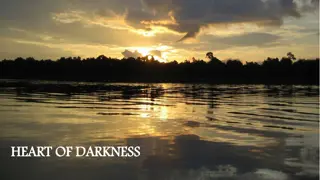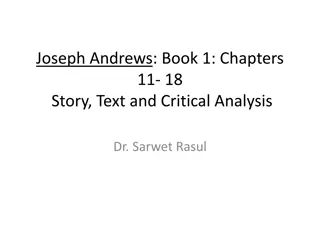Joseph Conrad: A Life of Exploration and Literary Legacy
Joseph Conrad, born in Poland, ventured to sea at a young age, traveled widely, and later wrote impactful works like "Heart of Darkness" based on his experiences in the Congo. His life was marked by adventure, trauma, and literary achievement.
Download Presentation

Please find below an Image/Link to download the presentation.
The content on the website is provided AS IS for your information and personal use only. It may not be sold, licensed, or shared on other websites without obtaining consent from the author. Download presentation by click this link. If you encounter any issues during the download, it is possible that the publisher has removed the file from their server.
E N D
Presentation Transcript
Joseph Conrad's Life Hannah Cummings, Lauren Henderson, and Alie MacVicar
Conrad's Childhood J zef Teodor Konrad Nalecz Korzeniowski was born on December 3, 1857 in Berdyczew, Poland to Joseph Theodore Appollonius Korzeniowski and Evelina Korzeniowski. His father was a writer and a translator of William Shakespeare's works. Because of his father's involvement in a movement seeking Polish independence from Russia, Conrad's family was forced to move to Russia in 1862. In 1867 Conrad and his father were allowed to return to Poland. The mind of man is capable of anything. Joseph Conrad, Heart of Darkness Conrad was greatly influenced by his father and through him, he developed a love of literature and tales of the sea.
Lover of the sea At the age of 16, Conrad saw the ocean for the first time. One year later Conrad went to Marseilles, France, where he entered the French marine service. In June 1878, at age 21, Conrad traveled to England and worked as a seaman on English ships. In 1880 he began his career as an officer in the British merchant service. On his voyages he traveled to Australia, India, Singapore, Java, and Borneo. These travels provided him the background for many of his works. Joseph Conrad in 1916 posing as ships enter the Suez Canal. In 1890 he traveled to the Belgian Congo, Zaire, and Africa. These experiences inspired his novel The Heart of Darkness.
Into the Congo Conrad described his ventures in the Congo as the vilest scramble for loot that ever disfigured the history of human conscience and geographical exploration As a child in, Conrad put his finger on a map of Africa and said, When I grow up I shall go there. In 1890, his wish was fulfilled and he sailed a steamboat up the Congo River in central Africa. During this voyage, Conrad witnessed horrible barbarity, illness, and inhumanity. His time in the Congo serves as the basis of Heart of Darkness. The title Heart of Darkness signifies not only the heart of Africa, but also the heart of evil and the wickedness in the heart of man. In his novel, Conrad openly denounces the whole European imperialistic policy.
The Horrors of the Congo Conrad's experiences in the Congo were very traumatic. He suffered psychological and spiritual shock. His physical health was also damaged and he suffered recurrent fevers and gout for the rest of his life. Conrad's voyage lasted four months and returned to England in January 1891. Etching by Walter Tittle
Later Life After his travels, Conrad married Jessie Emmeline George. They had two sons together. In 1923 Conrad visited the United States. One year later he was offered knighthood in England, but he declined. On August 3, 1924, at age 67, Conrad died of a heart attack and was buried at Canterbury, England. Conrad's gravestone bears these lines from Edmund Spenser: "Sleep after toyle, port after stormie seas,/ Ease after warre, death after life, does greatly please." The mind of man is capable of anything. Joseph Conrad, Heart of Darkness
Your strength is just an accident arising from the weakness of others. Joseph Conrad, Heart of Darkness
Works Consulted Annan, James Craig. Joseph Conrad. 1923. National Portrait Gallery. Accessed 10 Feb. 2017. Beresford, George Charles. Joseph Conrad. 1904. National Portrait Gallery. Accessed 10 Feb. 2017. "Democratic Republic of the Congo Large Color Map." World Atlas. Map. Gordon, Zahra. "In Homage to Those Who Died Silently." Friends of the Congo. Accessed 10 Feb. 2017. In The Rubber Coils. 1902 Encyclopedia. Accessed 10 Feb. 2017. "Joseph Conrad." Encyclopedia Britannica. Accessed 10 Feb. 2017. "Joseph Conrad Biography." Cliffs Notes, Houghton Mifflin Harcourt. Accessed 10 Feb. 2017. "Joseph Conrad Biography." Encyclopedia of World Biography, Advameg. Accessed 8 Feb. 2017. "Joseph Conrad in 1916." Harvard Magazine. Accessed 8 Feb. 2017. "Joseph Conrad Quotes." Goodreads. Accessed 8 Feb. 2017. Rothenstein, Sir William. Joseph Conrad. 1903. National Portrait Gallery. Accessed 8 Feb. 2017. Tittle, Walter. Joseph Conrad. 1923. National Portrait Gallery. Accessed 10 Feb. 2017.
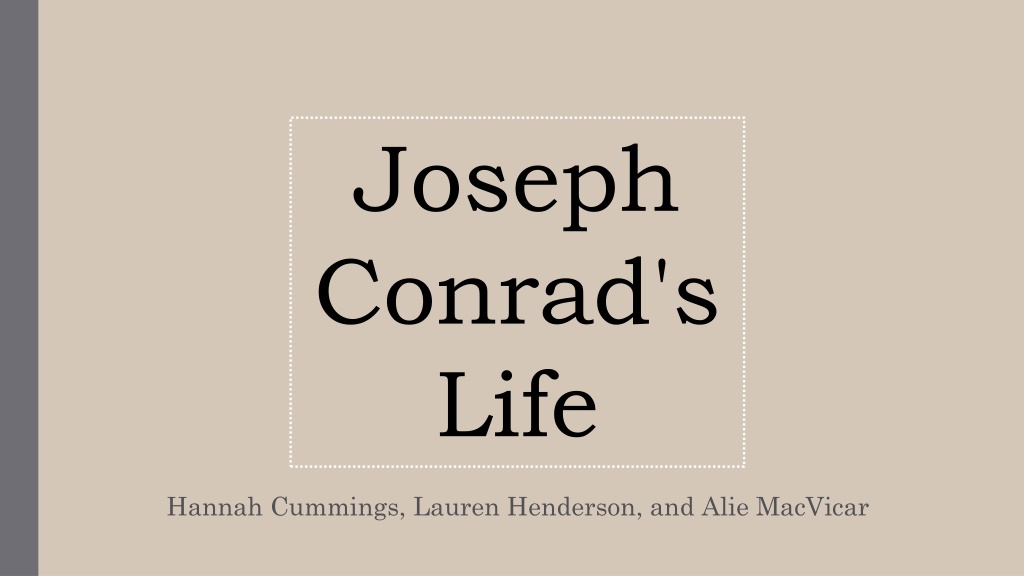
 undefined
undefined
















